I went to bed last night reading Louis C.K.'s admission of guilt in response to the allegations of sexual misconduct made against him by five female comedians. I woke up this morning to headlines touting Anthony Edwards accusing a producer of raping him and a friend when they were 14, a male model accusing George Takei of attempting to rape him in 1981, and WB suspending Flash/Supergirl co-showrunner Andrew Kreisberg after 15 women and 4 men (all of whom spoke on the condition of anonymity since many still work on those shows) accused him of sexual harassment.
The denials.Edwards' alleged abuser, Gary Goddard, has denied the accusation just as he denied similar accusations made against him in 2014 in a criminal case which eventually fell apart in court and resulted in his accuser going to jail for fraud. At the time of this writing, Takei has yet to respond. Kreisberg has vehemently denied all allegations while acknowledging that in his role as EP he's said things about actor's appearances others might have taken out of context and occasionally offered a non-romantic hug or kiss on the cheek some might have misinterpreted.
The week that was.All of this caps off a week which saw the Louis C.K. story explode and almost immediately end his career, Corey Feldman and others accuse Charlie Sheen of raping Corey Haim on the set of Lucas (a claim Sheen denies), Terry Crews file charges against his groper, more actresses come forth to bury Steven Seagal, and Ellen Page accuse the already-disgraced Brett Ratner of outing her when she was only 18 and generally acting like a lecherous pig on the set of X-Men: The Last Stand. S he also detailed troubling behavior she observed on other film sets when she was still a minor.
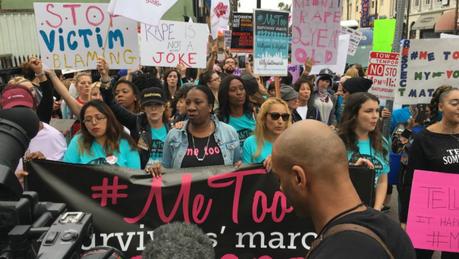
Hundreds of #MeToo survivors just marched on Hollywood (memorably chanting "Two, four, six, eight, we don't want to see you masturbate"), and the GOP is currently jumping through hoops to make the Roy Moore abuse story (or just Roy Moore in general) go away, leading outlets like Splinter to run with headlines like, " Fuck the GOP's Cowardly 'If True' Roy Moore Statements":
Hollywood's decisive response.We have always undervalued women's voices. Believing the women who have come forward with their stories against Moore might not even be enough-it's been a year since Donald Trump was elected president, even after several women came forward with their stories of sexual assault. A poll from October 2016 showed that 68% of registered voters believed that Trump made unwanted sexual advances toward women.
As Jia Tolentino wrote in the New Yorker on Thursday morning, we failed the women who came forward to accuse Trump almost exactly a year ago. As the Moore story plays out, and Republicans jump in with their "if true" statements, it seems depressingly unavoidable that we will fail the women who came out with their stories today.
Hollywood, however, is determined to not fail any women and men who are coming forward with their own stories of assault. Such accusations are triggering instant suspensions and project cancellations in ways we've never seen before, even if it leaves the livelihoods of over 2,000 House of Cards Baltimore crew members hanging in the air.
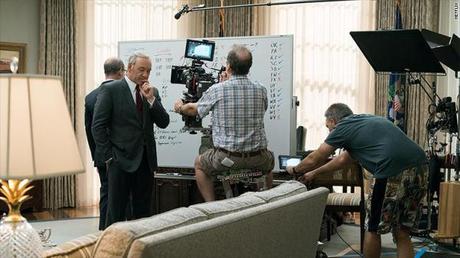
Of course, some of those crew members are among the now dozens of Kevin Spacey accusers, which is a pattern we see repeating itself. For the serial offenders in Hollywood right now, all it takes is one person (either on the record or anonymously) to speak up. Once they do, the corroborating stories from similarly harassed or abused come flooding in.
Thus, decades of inaction are now being met with vigilant reaction and systemic self-reflection, both as a matter of image control and improving employee morale as well as simply doing the right thing. This is obviously larger than Hollywood, but what Hollywood does in response to it can help countless others deal with their own experiences. As Edwards wrote in his heartfelt essay about his own experience, "There are millions of children in our country who are one conversation away from being heard. Just as there are millions of adult men who are one step away from healing. I did not go from being a victim to a survivor alone. No one does. I had to ask for help, and I am so grateful that I did."
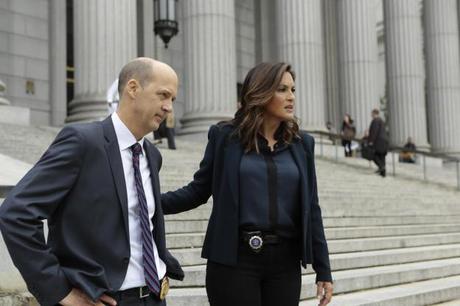 The "witch hunt" defense and argument.
The "witch hunt" defense and argument. So, when Jeremy Piven, who stands accused of harassment by three different women, writes on Instagram, "We seem to be entering dark times - allegations are being printed as facts and lives are being put in jeopardy without a hearing, due process or evidence," we roll our eyes and think, "Sounds like something a guilty person would say."
Just as Rose McGowan memorably had this to say in response to Woody Allen's misinterpreted statement about Harvey Weinstein:
Allen also expressed concern over us entering "a witch hunt atmosphere" where "every guy in an office who winks at a woman is suddenly having to call a lawyer to defend himself."
In this case, the messengers are clearly flawed, but is the message as well? Do they have a point? Are we in the midst of an unprecedented industry-wide cleansing and national conversation about gender relations and workplace harassment? Or are we looking at a witch hunt? Or is it kind of both at the same time?
THR's Stephen Galloway, for one, is concerned about the potential for collateral damage:
Our rocky relationship with, well, everything these days."I'm terrified that, in our righteous quest to do good, we're sweeping up the innocent as well as the guilty. We're accepting allegations in the place of solid proof. We're conflating those guilty of more minor crimes with perpetrators of egregious and even criminal behavior.
Journalists have a responsibility to stand firm, to not get swept up in the rush to judgment or the race to break a story, remembering that some of the most incendiary material may turn out to be less combustible than it seems. But faced with white-hot competition, we're giving up tried-and-tested codes of conduct, knowing that if we don't, we'll lose the battle to get the story first. We in the media are not verifying and re-verifying the facts, but only checking that so-and-so did indeed say such-and-such - not always even on the record."
Of course, that old standard of needing some to go on the record is reportedly why NBC opted not to run Ronan Farrow's bombshell Harvey Weinstein story, and look at the beating their reputation has taken as a result. Considering the way the Weinstein story mushroomed, Farrow's journalistic instincts were correct, turning NBC's journalistic caution into an integrity-sapping indictment of not just them but broadcast news in general.
And that feels like a very 2017 thing to happen. We don't trust the news anymore and haven't for years, yet far too easily fall for fake news on Facebook. We don't trust men in power because in a world with Donald Trump as President everything seems suspect and corrupt (or, if you support Trump, you likely responded to his anti-establishment message which casts doubt on the reliability of the media and government).
The way "blame the victim" has been codified into law.We don't trust the justice system for oh so many reasons but in this case its history of continually failing those who actually file charges against sexual abusers or harassers (via Slate):
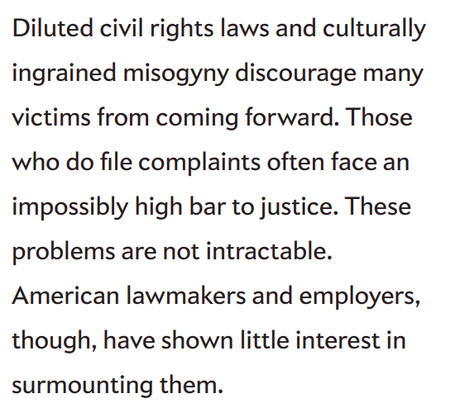
Thus, even with the nearly 7,000sexual harassment complaints received by the Equal Employment Opportunity Commission (EEOC) last year and thousands more by state agencies three out of every four victims of workplace harassment still don't report it. The 500,000 people who tweeted #MeToo in the 24 hours after Alyssa Milano's call to action last month can certainly speak to that.
It's partially down to our laws, which more or less codify the "blame the victim" mentality. The Supreme Court's controversial interpretation of Title VII of the Civil Rights Act, 1998 Faragher-Ellerth precedent on the standard of legal liability in such cases, and regrettable 5-4 decision in 2013's Vance v. Ball State University case of 2013 has created, as Slate put it, "a legal environment that encourages victims of sexual harassment to remain silent."
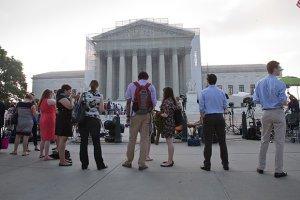
The burden of proof falls on the accuser, not the accused. They don't just have to prove the harassment, though; they also have to demonstrate they tried hard enough to bring their complaint to the attention of their supervisor, which Vance v. Ball narrowly defines only as someone who has the power to hire or fire them. If you don't do everything exactly right the employer can just wave that sexual harassment policy form you signed when you were first hired and make the case go away.
In such an environment, you fight the good fight regardless, stay silent, or play by the rules of mandatory arbitration and non-disclosure agreements, where you get paid for your silence but in exchange lose your right to sue or even speak about it publicly without being sued yourself. That's why Rose McGowan talking about Harvey Weinstein raping her is technically illegal - she signed an NDA. It's a flawed system which only exists because our laws governing such cases are already flawed, and while Congress and individual states have the power to force through changes we all know they won't.
Why harassment is so pervasive - gender disparity.If you exist in a system where you believe you can legally get away with anything you'll try everything. But it's not as simple as that. It's even more systemic. Simply put, there aren't enough women in positions of leadership in the workforce. They occupy over half of professional-level jobs but only hold a quarter of all senior and executive-level postions. T hat has allowed misogyny to grow as has the media's tendency toward sensationalism and "blame the victim" reactions.
It's even worse in Hollywood. Here are the latest statistics from USC's Annenberg School for Communication and Journalism:
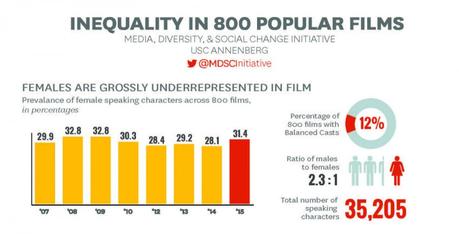

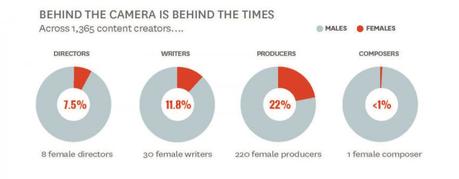
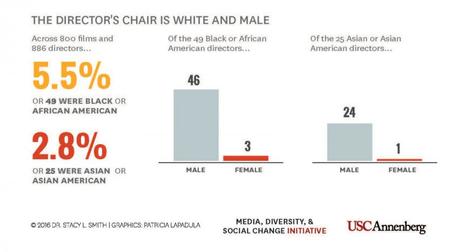 How Hollywood is setting the standard for how to respond.
How Hollywood is setting the standard for how to respond. 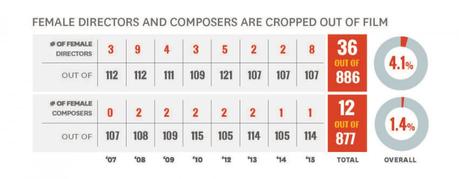
Moreover, in the Hollywood boardrooms, women hold only 20% of corporate, chief executive, and executive management positions.
But it's not even that simple. We're also talking about an industry where plenty of people knew about Harvey Weinstein's reputation for years and did nothing, an industry where agents who should have and sometimes likely did know better persisted in sending their young, female clients to his hotel room without offering them warning or protection. It's a system built on thousands profiting off the vulnerability of few, and this inherently creates power dynamics that are easily taken advantage of.
Factor on top of that the decades upon decades of abuse that occurred and is only now being reported by, and it's a recipe for an industry crisis.
With change unlikely to come from the courts or lawmakers employers need to take actions they aren't legally required to in order to send a message to employees about what kind of behavior is acceptable and how they will be punished.
Employers need a push to do this, which is what the steady drumbeat of harassment and abuse allegations does. When the actual courts have failed us and corporations have turned fat, lazy, and predominantly run by white men, a victim's only reliable mechanism of action is to simply share their story and hopefully shame their abuser and his or her enablers into professional ruin or at least public contrition. This environment (and the desperation of the media to get right wrong NBC got wrong with Weinstein) also inevitably leaves open the possibility of false accusations, ones which the accused may eventually disprove but never escape the associated stigma and career assassination.
But which ethical hill would you rather die on: The one filled with the theoretically ruined lives of falsely accused, or the one which is flipping the script away from literal decades of blaming the victim and over toward empowering victims and embracing the potential for change?
What do think? Let me know in the comments.

